Apr 30, 2025 – Day 73 of 100-Day Dharma Talk, Weekly Dharma Assembly
Hello. This is the 73rd day of Venerable Pomnyun Sunim’s 100-Day Dharma Talk. Today is the Weekly Dharma Assembly where Jungto Society members examine their practice.
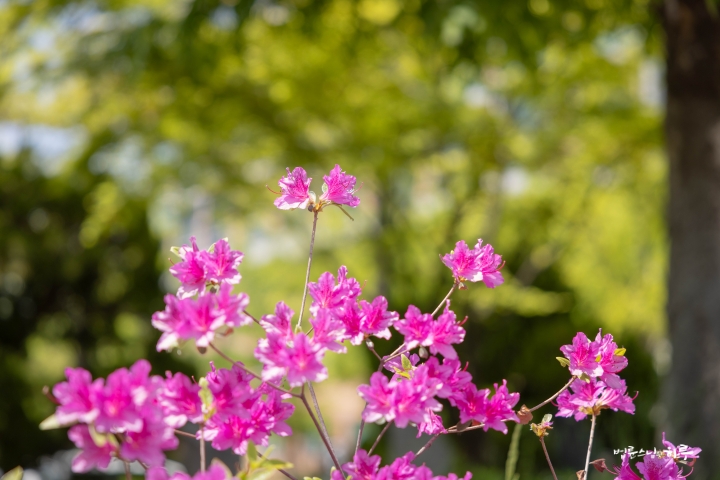
After completing his morning practice and meditation, Sunim headed to the Jungto Social and Cultural Center for the Weekly Dharma Assembly.
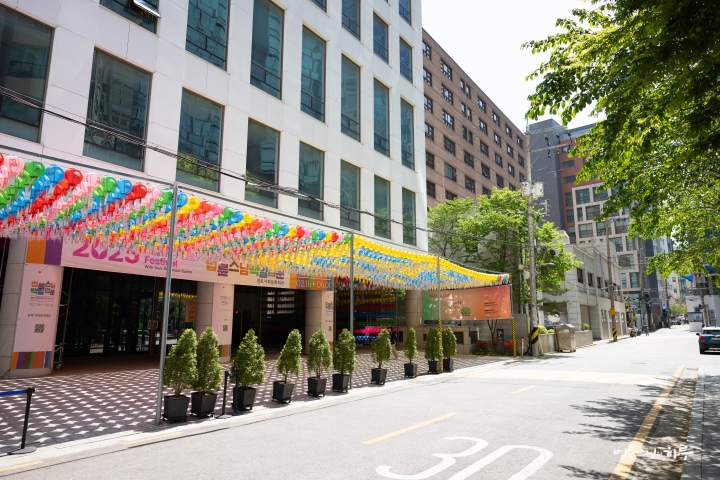
At 10:15 AM, the assembly began in the third-floor Dharma hall with about 150 people in attendance, starting with the recitation of the Three Refuges and the Heart Sutra. Jungto Society members from across the country also participated online.
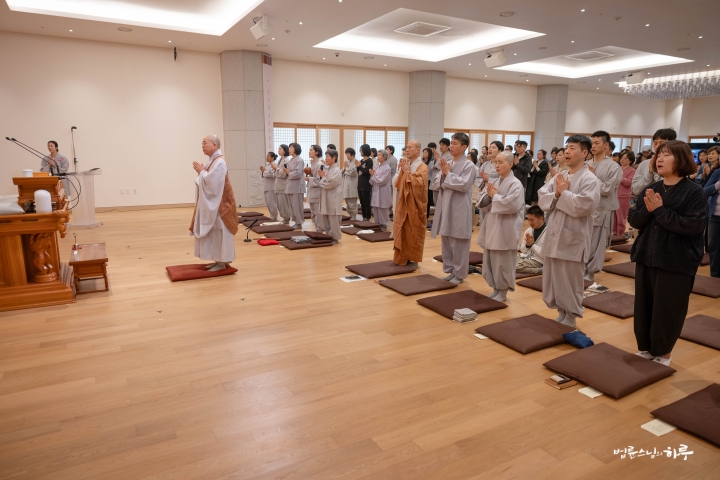
First, a video showing the activities of Jungto practitioners over the past week was presented. The main temples of Jungto Society had been busy preparing for Buddha’s Birthday.
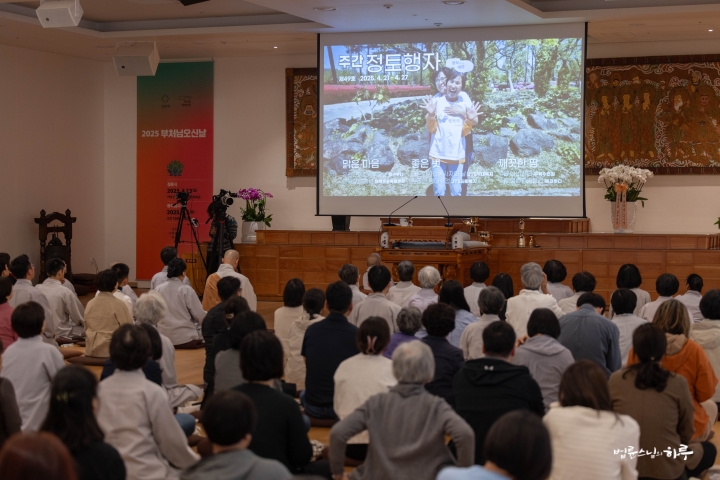
The assembly members requested Sunim’s Dharma talk with three full bows. Sunim began by sharing news that JTS had decided to donate supplies to help victims of forest fires in North Gyeongsang Province return to normal life in commemoration of Buddha’s Birthday.
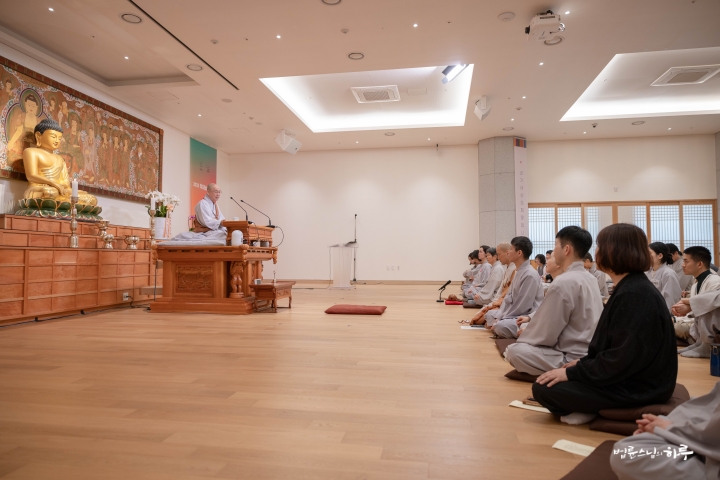
“Recently, there were severe forest fires in North Gyeongsang Province. This was the first time we’ve experienced such large-scale forest fires. We initially thought the fire department would handle it well, but as we saw the damage increasing, JTS belatedly joined the emergency relief efforts. However, by the time we responded, most of the fires had been extinguished, so we couldn’t provide comprehensive emergency relief. We did supply some necessary items for containing the remaining fires and essential daily necessities for the affected residents, but overall, our support was not sufficient.
Thinking of Those Affected by the Forest Fires
As Buddha’s Birthday approached, we reassessed the situation and found that about 3,000 people had been affected by these fires. When we inquired about their most pressing needs, we learned that the government and local authorities were generally providing good care, covering most basic necessities. However, those living in temporary shelters like containers or motels after losing their homes had no basic condiments like soybean paste, red pepper paste, and soy sauce. Therefore, JTS has prepared $100,000 in relief funds to provide basic condiment sets to all affected households. We originally planned to deliver these before Buddha’s Birthday, but due to the time needed for ordering and packaging the products, we’ve scheduled the delivery ceremony for May 8th, Parents’ Day.
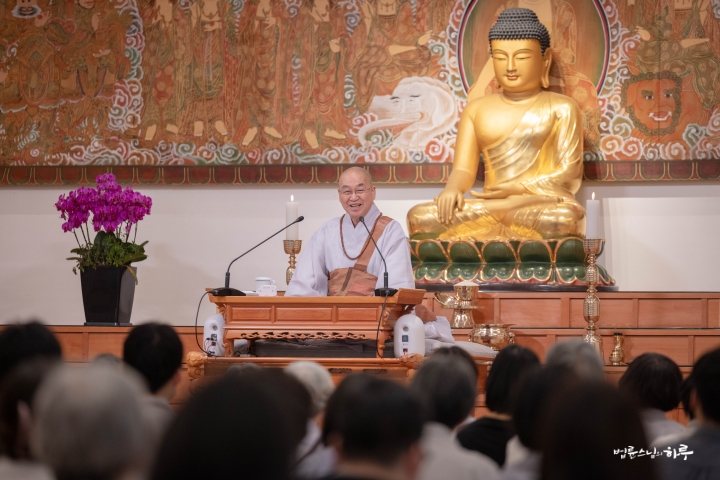
Additionally, many temples, including Gounsa Temple, suffered significant damage from these forest fires. So, in celebration of Buddha’s Birthday, we’ve decided to collect your donations and contribute them to the Jogye Order headquarters to help restore damaged temple cultural properties. Support for the fire-affected areas must continue. Currently, the most urgent needs are essential appliances like refrigerators and washing machines. Cooking meals and doing laundry at home are basic daily activities. Moreover, as the weather gets warmer, refrigerators are particularly crucial. When I was young, we lived without refrigerators, but nowadays, it’s practically impossible to live without one. However, since these appliances are expensive, we can’t provide them selectively to some households and not others. Supporting all affected households would require tens of millions of dollars, so we’re exploring various approaches, including potential partnerships with corporations.
Hoping Buddha’s Birthday Alleviates the Loneliness of Marginalized Neighbors
On Buddha’s Birthday, we should reflect on why the Buddha came into this world, how he attained enlightenment, and the meaning of his entering nirvana. While we commemorate Buddha’s birth, enlightenment, and passing separately, Southern Buddhist traditions celebrate all three events together on ‘Vesak Day.’ I hope that Buddha’s Birthday becomes an occasion not just for personal joy but for sharing happiness with those around you.
The Korean Peninsula desperately needs peace, our society needs harmony among citizens, and marginalized neighbors need warm comfort to ease their loneliness. If there are isolated elderly or lonely neighbors in your area, please consider visiting them. Parents’ Day is approaching soon. Take this opportunity to visit your parents or at least give them a call if they live far away. It would be contradictory as practitioners to revere the Buddha while being indifferent to our own parents. I’m not suggesting you become attached to family matters. Rather, I hope these special occasions can serve as opportunities to reconnect with people you haven’t contacted in a long time and share your hearts with them.”
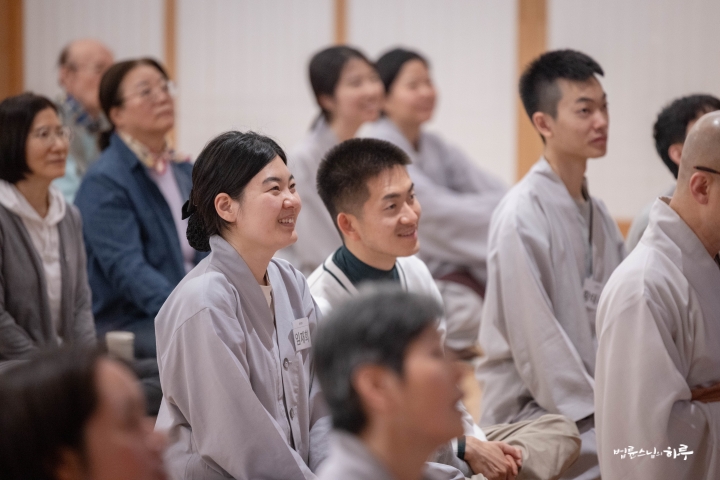
Following this, people who had submitted questions in advance took turns asking them. One person online and one person at the venue each asked questions and engaged in dialogue with Sunim. One of them, who has been running a chicken restaurant in their neighborhood for 21 years, asked Sunim for advice, concerned about possibly violating the precept against killing as a practitioner.
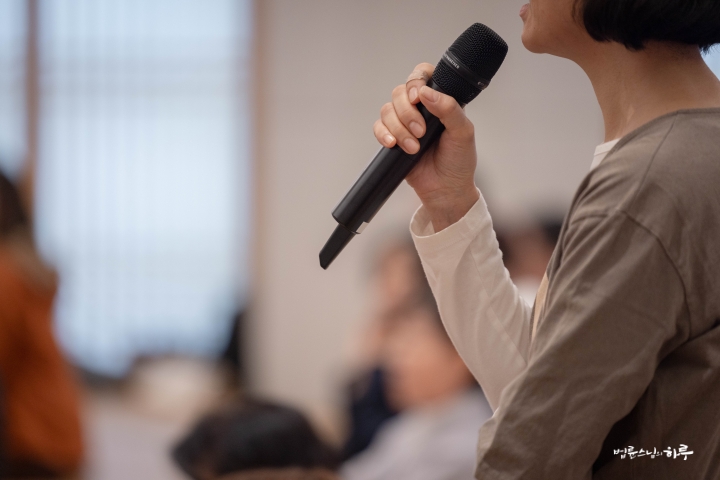
Does Running a Chicken Restaurant Violate the Precept Against Killing?
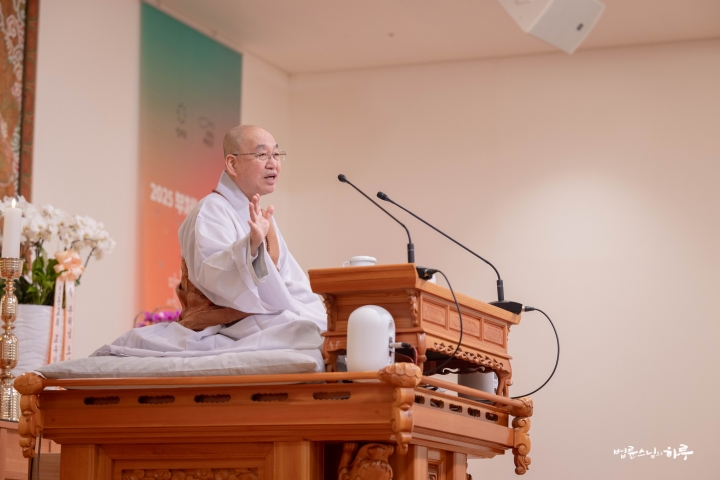
“If you can live without significant hardship after quitting this job, it would be better to stop. Not because someone told you to, but because if you don’t need to continue, there’s no reason to do so.”
“But that’s just that person’s opinion. I’ve been running my business confidently all this time and viewed it simply as a profession. I never once thought it was wrong. However, after hearing those words, my resolve was somewhat shaken. Now I’m thinking, ‘That’s just their opinion, and I should follow my own path.’ I’m wondering if this could be a problem as I live the life of a practitioner.”
“You can’t proudly claim that frying others’ flesh in boiling oil every day is a good deed. Think about it—if you die later and go to hell to experience the same thing, would that be something to be proud of? (laughs)
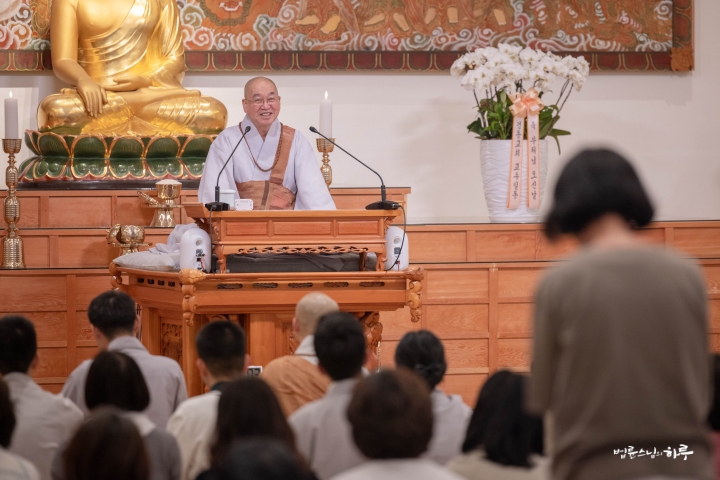
In life, there are best paths, second-best paths, less harmful paths, and worst paths. Similarly, when making choices, there are best choices, second-best choices, less harmful choices, and worst choices. Can we always take the best path? In reality, that’s not possible. To always take the best path, one would need to renounce the world like the Buddha, eating only food that others have discarded, wearing only clothes that others have thrown away, and sleeping under trees or in caves. Living such a life would cause no harm to humans or any other beings in the world.

However, we cannot always take the best path in life. That’s why second-best paths exist. For example, eating food that others have discarded doesn’t take away from anyone else’s share. Also, my eating that food doesn’t cause someone else to go hungry. This isn’t building my happiness on others’ misfortune, as the Buddha warned against. There’s the path of living like the Buddha, and there’s also the path of living as a lay practitioner according to the Buddha’s teachings. In fact, when the Buddha was alive, he didn’t only present the path of monastic practitioners but also opened the way for lay practitioners who found it difficult to follow that path.
As a lay practitioner, one should observe at least the following five precepts to be considered a practitioner: First, do not harm life recklessly. Second, do not steal or take others’ possessions. Third, while marriage is permitted, refrain from sexual misconduct or improper sexual behavior. Fourth, do not lie, use abusive language, or deceive. Fifth, do not drink alcohol to intoxication. If one cannot keep even these five precepts, they cannot be considered a practitioner.
However, there is no precept explicitly forbidding meat consumption. For example, if a rabbit died in a forest fire, eating its meat has no direct connection to killing. By eating that meat, you haven’t killed a living being or encouraged killing. In such cases where there’s no connection to killing, there’s no reason to abstain from meat. However, if you believe that eating meat induces killing, then even if you didn’t kill directly, it could ultimately encourage killing.
If meat is included in food that would otherwise be discarded, I think it’s acceptable to eat it. My eating it doesn’t cause more killing to occur. However, if meat is included in food specifically prepared for me, that’s different. That meat could have been eaten by someone else, and my eating it might increase the possibility of more killing. So these two cases are different. One has no connection to killing, while the other might encourage it. For example, airplane meals are discarded if not eaten. In such cases, whether I eat the food or not has no connection to killing. On the other hand, if I pay for meat at a restaurant, meat consumption increases, and so does killing. Ultimately, the best path isn’t just about not killing directly. From a Buddhist perspective, it’s also about refraining from actions that might induce killing.
Even for monastics, there is no precept saying “Do not eat meat.” However, if someone killed an animal specifically to serve a monastic, eating that meat would induce killing. This is because if the monastic didn’t eat meat, there would be no reason for that person to kill the animal. This constitutes indirect killing, even if not direct. That’s why the scriptures say, “Do not eat meat if you believe it was killed for you.” If meat is included in a meal at someone’s home, it’s acceptable to eat it. But if meat was prepared separately to entertain you, it could be seen as killing that occurred because of you.
Today, we buy meat from butcher shops, but in the old days in rural areas, people would kill animals at home when guests arrived. If you didn’t eat meat, they wouldn’t have killed that animal, but because you said you would eat it, killing occurred. The scriptures say not to eat such meat. While there’s no precept saying “Do not eat meat,” there is a record saying, “If meat was killed specifically for you, do not eat it.” This applies to practitioners following the best path.
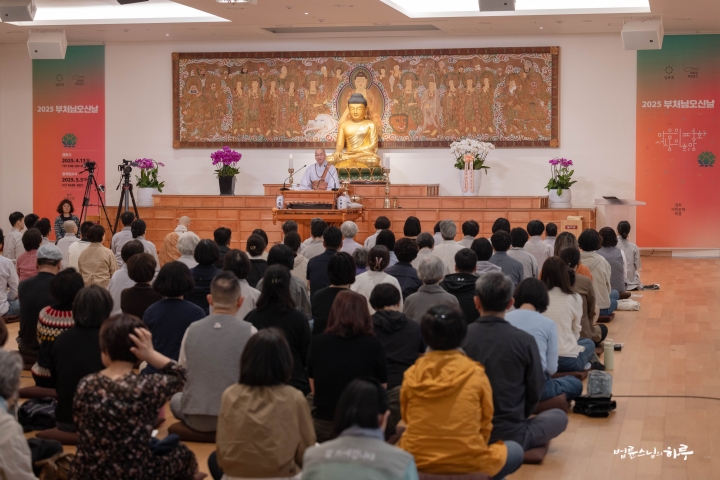
On the other hand, for lay practitioners following the second-best path, it is stated that they only need to avoid directly taking life. There is no prohibition against buying and eating meat at restaurants. This falls under the second-best path.
If you cannot follow the second-best path, there is the less harmful path. For example, some people have occupations where taking life is unavoidable, such as fishermen or butchers. It is better to avoid such work if possible. However, there are people like Eskimos or Mongolian nomads for whom this is their only means of livelihood. They live by slaughtering the sheep they raise. In those regions, there are no vegetables, and nothing to eat except meat. We cannot tell such people not to believe in Buddhism. If Buddhism were to exclude them simply because of what they eat, it would be no different from Christianity telling sexual minorities not to believe in God because of their orientation. Just as sexual minorities should be able to believe in God and practice their faith, people in different environmental conditions should also be able to practice according to the Buddha’s teachings.
Of course, it would be better if they could live without killing sheep. Nowadays, they could sell sheep and buy other food. But in the past, the concept of a market didn’t even exist. In summer, they fed grass to sheep, milked them, and lived on cheese or butter made from that milk. When winter came, they slaughtered sheep for meat, dried some of it thoroughly, and lived on it until summer. That was the lifestyle of that region at that time. We cannot ignore these living conditions. Practice must always be grounded in reality. If you cannot take the best path, you should take the second-best path, and if the second-best path is difficult, you should at least take the less harmful path. However, in any case, you should avoid the worst path.
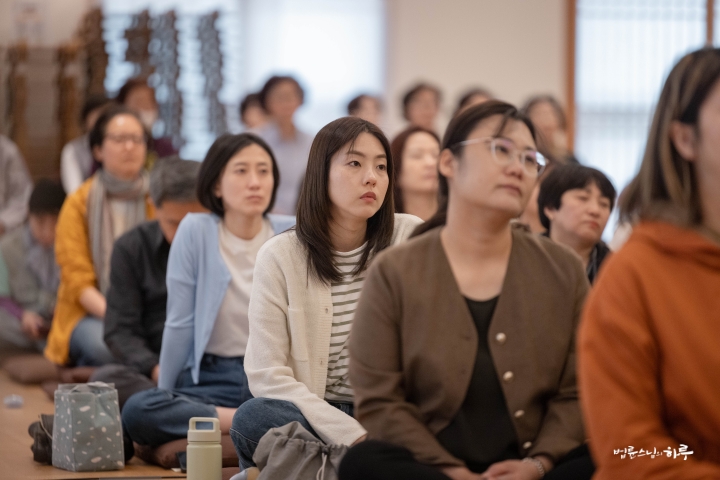
If your occupation involves slaughtering animals, it would be better to avoid it if possible. However, if that job is your only means of livelihood, the situation changes. For example, telling a fisherman who grew up by the sea ‘don’t catch fish’ is essentially telling them not to believe in Buddhism. The dichotomy that one must abandon their profession as a fisherman to believe in Buddhism is contradictory. Fishermen should also be able to practice Buddhism. In this way, career choices for livelihood require practical considerations. Even if not ideal, they can be accepted as second-best or less harmful paths. However, even when such actions are permitted for practical reasons, you should not consider them natural or take pride in them. It’s simply a path chosen under unavoidable circumstances, not something that is right or natural. Do you bring live chickens to your chicken restaurant, or do you use pre-slaughtered frozen chickens?”
“I’m a franchise owner, so I use pre-slaughtered frozen chickens.”
“Then since you’re not directly killing the chickens, it’s not the worst case scenario. However, continuing to bring in and sell frozen chickens maintains demand, which ultimately leads to more chickens being killed. Therefore, from a Buddhist perspective, this occupation cannot be considered the best path. That’s why I initially asked if you could make a living without this job. For instance, if you could run a clothing store or farm instead of a chicken restaurant, there’s no need to insist on keeping the chicken business. If you’re continuing solely because it’s more profitable, it would be advisable to change your occupation.
However, if realistically you have no other skills, or you’ve been doing this for 20 years, and you’re not directly slaughtering chickens but rather frying and selling pre-slaughtered ones, then it’s not the worst situation. It can be considered the less harmful path because it induces killing, or it could be seen as a second-best option since you’re not directly killing. Ultimately, it falls somewhere in between these two perspectives.
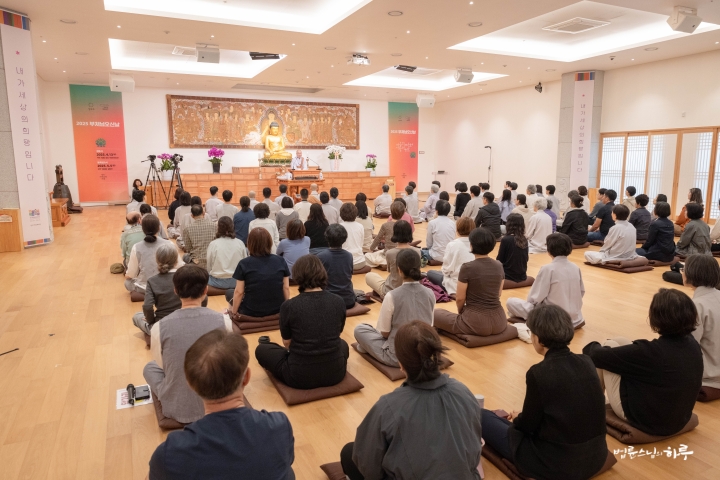
Of course, it would be better to shift toward a more positive direction, but not being able to do so doesn’t mean you’re committing a sin. It’s just your profession, and it doesn’t violate the Five Precepts. Someone might express the opinion that “running a chicken restaurant causes harm to living beings, so it’s not good.” However, if someone claims that your son will suffer negative consequences because of this job, that person is mistaken. You can simply accept that it would be preferable to change professions if possible.
If someone were to tell me, “As a monk, you should wear tattered clothes, but your clothes look too nice,” there would be some truth to that opinion. I also believe it would be better if I could live more frugally. However, these days it’s not easy to mend and wear tattered clothes. In the past, there were people who would repair worn clothes, but now hardly anyone takes on such tasks. Everyone advises throwing them away rather than putting in the effort to fix them. Fortunately, Jungto Society has a sewing workshop with volunteers who repair clothes. Thanks to them, I can continue wearing these mended clothes. If such people weren’t available, I would have had no choice but to discard worn clothes as well.
We should do our best within our capabilities. However, if a situation is truly beyond our control, we must accept reality. Of course, it would be ideal to wear clothes others have discarded and eat food others have thrown away, but even if we can’t go that far, we should try not to buy new clothes, eat modestly, and live simply.
Looking at the questioner’s profession from this perspective, you shouldn’t justify it by saying, “What’s the problem since I’m not stealing from others?” Conversely, you don’t need to condemn yourself thinking, “I’m committing a grave sin.” This is the middle way perspective. Does that help clarify things?
“Yes, that makes sense. And how should I pray?”
“When it comes to prayer, do as you wish.” (laughs)
“Thank you.”
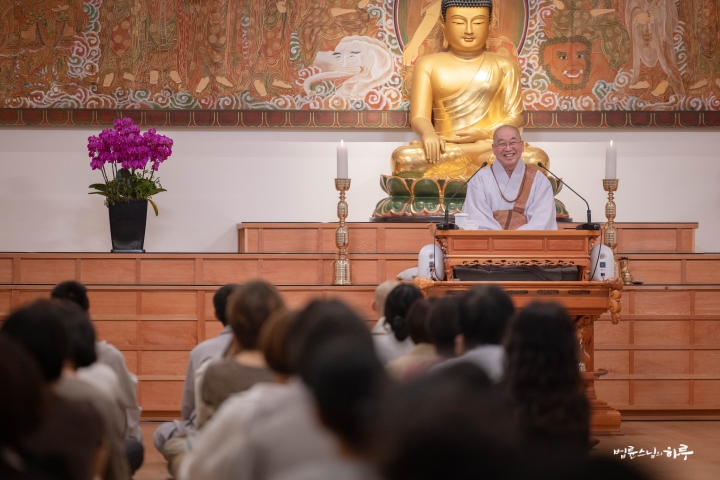
“Answering how one should pray is ambiguous. Usually, prayers have specific purposes—whether dealing with marital conflicts, disobedient children, business difficulties, or psychological anxiety. With such specific circumstances, I could offer tailored advice. But asking ‘How should I pray?’ without any context is too vague, as solutions vary depending on the situation. People ask such questions because they expect Buddhism to be a panacea, believing that simply reciting one prayer formula will solve all their marital, parental, business, and even health problems.
The Buddha’s teaching (Dharma) ultimately shows that liberation begins when we let go of whatever we’re clinging to. But asking for just one prayer formula reflects a desire to grasp something that contains all your desires. This request itself contradicts the Buddha’s teachings. Therefore, responding with ‘Use this prayer formula’ would actually go against the correct teaching. That’s why I answered that you should pray however you like. You might object to such a response after being encouraged to ask, but it’s actually the most appropriate answer to this question. When you’re trying to get what you want, do whatever you prefer—it’s entirely up to you.”
“I understand.”
The questions continued.
• Democratic politics allows extremism to exist in the name of diversity. Yet extremism undermines diversity. How can we overcome this contradiction?
• The Buddha showed the right direction for living. On the other hand, he also taught that there is no right or wrong. Isn’t deriving a right direction for living contradictory?
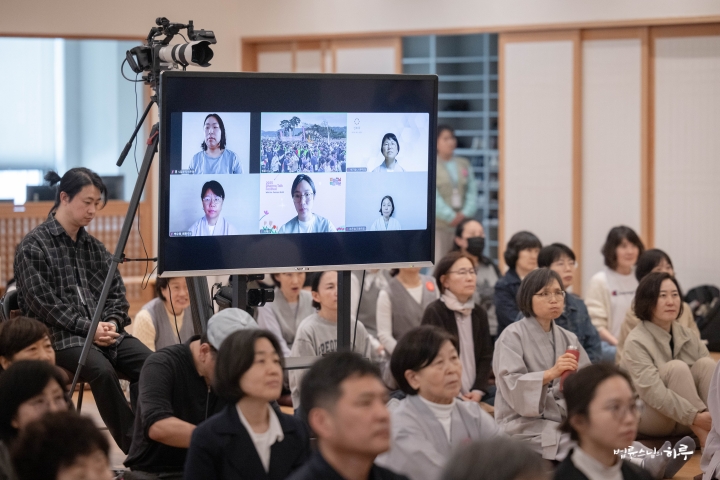
As the questions continued, it was time to conclude the Dharma assembly. We agreed to continue our conversation at next week’s Weekly Dharma Assembly and ended at noon.
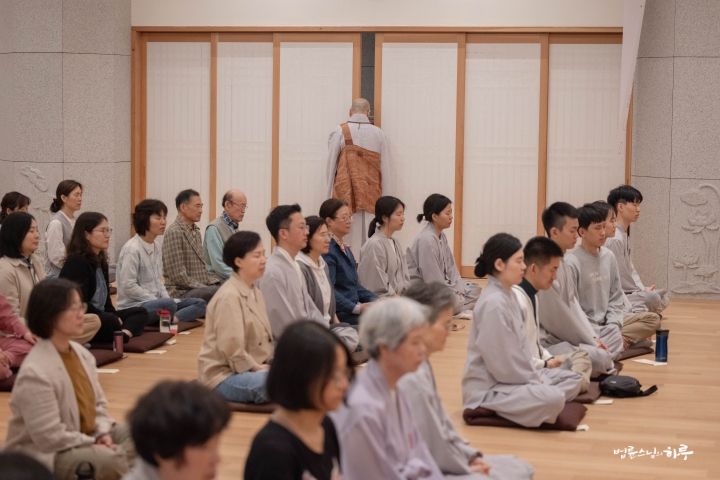
After leaving the third-floor Dharma hall, Sunim went to the basement dining hall to have lunch with the Sangha. After finishing his meal, at 2 PM, guests arrived for tea and conversation.
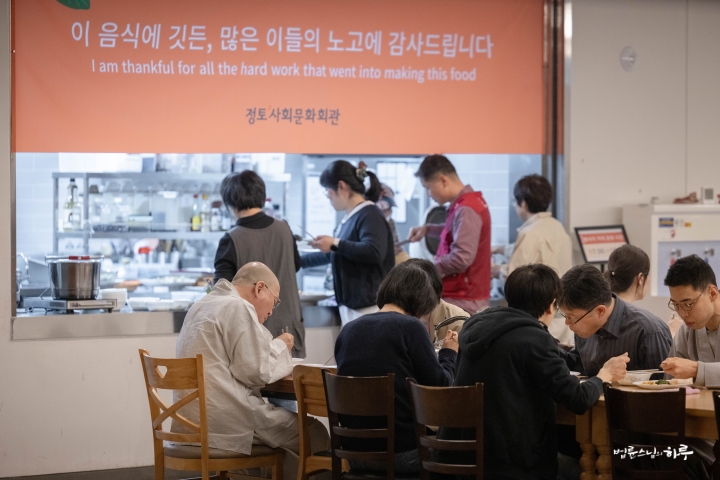
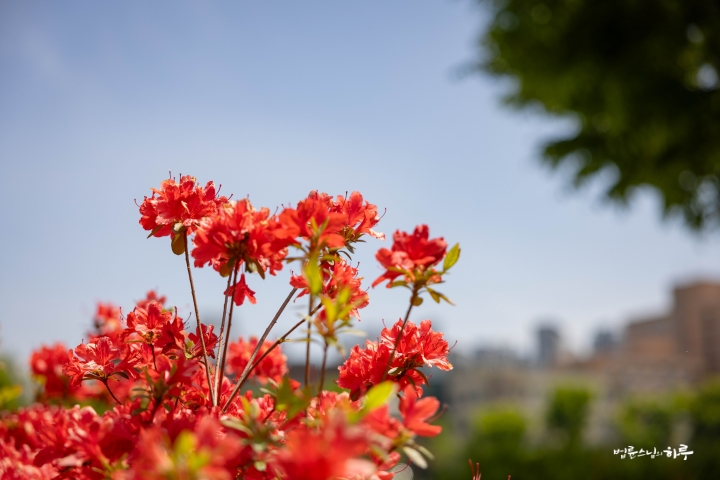
After the guests left, Sunim spent the afternoon working in his office until 5:30 PM, when he welcomed another visitor to The Peace Foundation. Congressman Kim Byung-joo of the Democratic Party came to have dinner with Sunim followed by tea. They had extensive discussions about the role of politicians in national unity, as well as ways to overcome crises in politics, diplomacy, unification, and security.
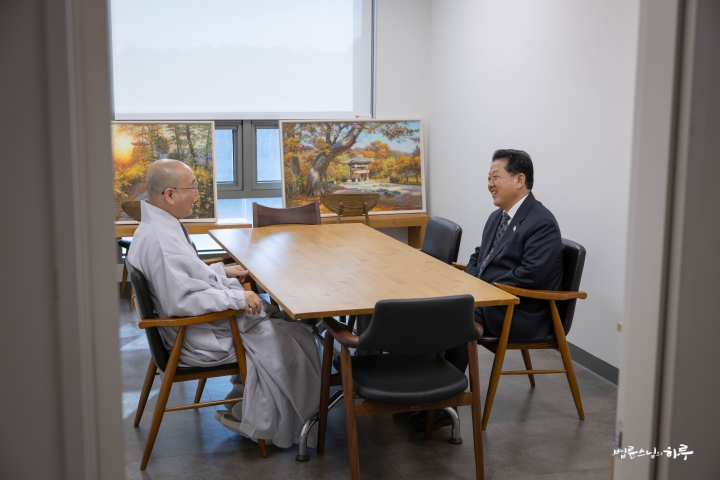
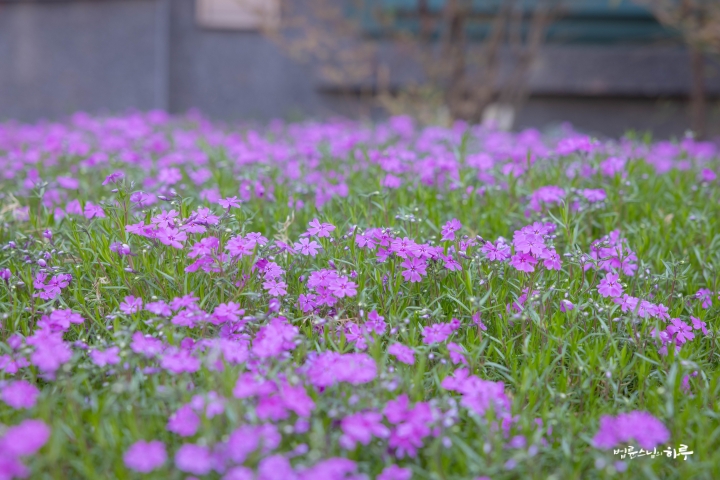
As the sun set, the evening Weekly Dharma Assembly broadcast began at 7:30 PM. About 150 people gathered in the third-floor Dharma hall, while Jungto Society members connected through an online meeting room. They requested Dharma teachings from Sunim with three bows.
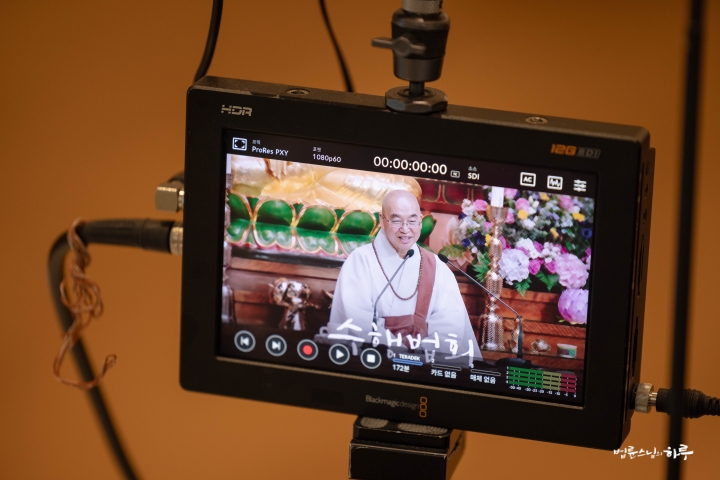
Like in the morning, Sunim spoke about relief efforts for wildfire victims in North Gyeongsang Province and the proper attitude of practitioners approaching Buddha’s Birthday before beginning the dialogue.
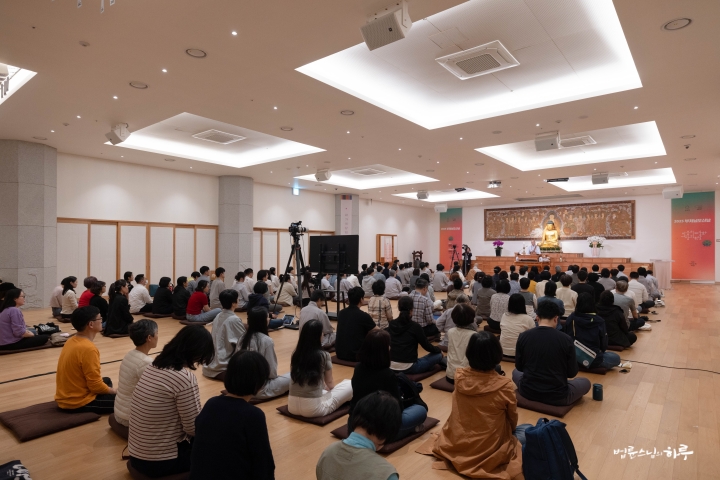
Today, many members from the Special Youth Division visited the Jungto Social and Cultural Center. One person asked a question in person, and three asked questions online. One woman sought Sunim’s advice about her husband who couldn’t overcome his grief after their son suddenly died of a heart attack.
After my son’s sudden death, my husband is suffering terribly.
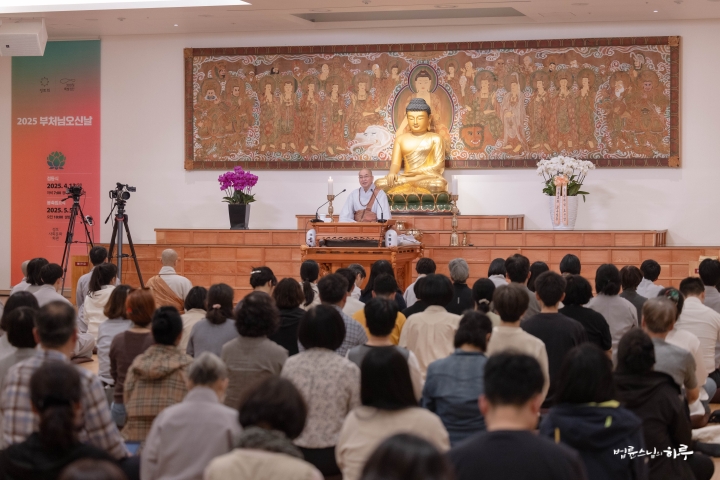
“From what I’ve heard, you’re already handling this well—what more advice can I offer? It seems you want to reduce your Jungto activities a bit to spend more time with your husband. By the way, how did your son die?”
“The autopsy showed the cause was a heart attack.”
“Do you know if a heart attack causes severe pain? Or do people die peacefully, as if falling asleep?”
“When I arrived at the scene, there were signs that he had struggled, which broke my heart.”
“Even so, do you think he suffered for a long time? Or was it just a few minutes?”
“I think it was brief.”
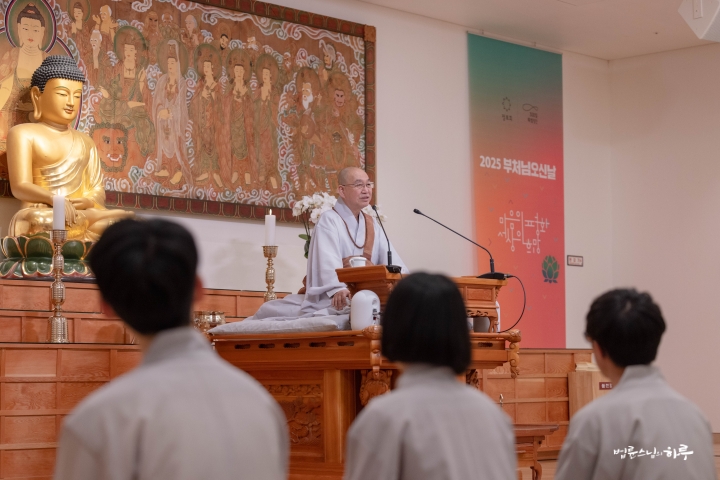
“You feel sad because your son suddenly left you, but he died peacefully. Your task now is ‘how to manage my feelings of loss.’ There’s nothing you need to do for your son. He departed peacefully. He didn’t die intentionally. So you don’t need to worry about him. You just need to live well yourself.
Typically, losing a child makes it difficult to regain one’s composure. But you seem to be coping remarkably well, perhaps because you’ve already experienced losing your mother and have attended the Jungto Dharma School. However, this is your husband’s first such experience. He hasn’t lost his parents yet, and he suddenly lost his child, so his shock must be much greater. There’s an old saying: ‘When parents die, they’re buried in the ground; when children die, they’re buried in the heart.’ That speaks to how profound the pain is. But no amount of grieving will bring your child back. Your son lived his life and then departed. If you didn’t cause his death, there’s no need for guilt. It was the child’s destiny. Regrets like ‘If only I had been there…’ are endless. Even if you had been in the next room, you might think, ‘Why didn’t I open the door to check on him?’ So clinging to regrets has no end.
You might consider that such a sudden departure could be better than suffering prolonged pain from a traffic accident or illness. We need to accept what has already happened in a positive light. It’s already happened—like water that has been spilled. When something irreversible occurs, it’s better to see it as something positive. Though your son lived a short life, it’s good to think that he lived a meaningful life, remembered as a good friend by his peers.”
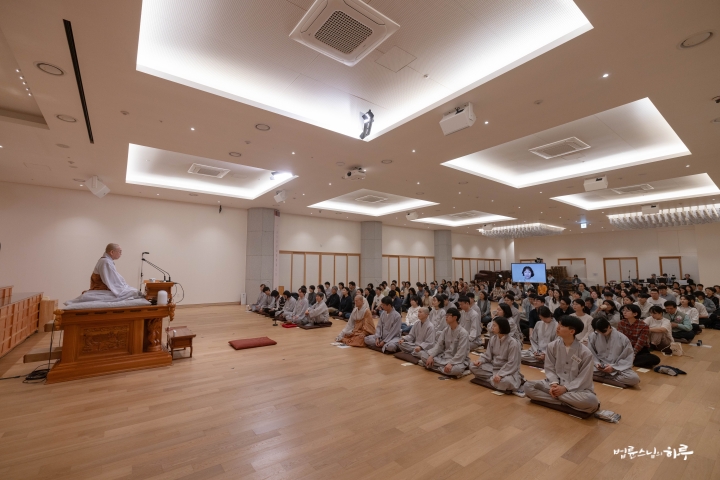
Living a long life doesn’t necessarily mean living a good one. Jesus passed away at thirty-three, and Choe Je-u died at forty, yet they lived meaningful lives. Living longer doesn’t automatically mean living better. We often try to evaluate life based on “how long someone lived.” However, whether a life was well-lived cannot be judged by its length alone.
First, while it’s sad that your son lived a short life, you can be grateful that he lived fully in his own way. The same applies to us. I don’t know if I’ll die tomorrow or the day after. That’s why living each day to the fullest is the best way to honor your child and support your husband.
Second, the reason your husband is struggling is clear. This is his first experience with the death of a family member. And it happened suddenly, losing his son before himself. You need to understand that his shock is bound to be immense. In this situation, gently patting his back, giving him a hug, and sharing meals together provide the greatest comfort. Don’t try to console him with phrases like “Everyone dies eventually.” Rather than such words, simply holding his hand when he cries and embracing him is enough. As time passes, the pain will gradually heal, and he will return to normal.
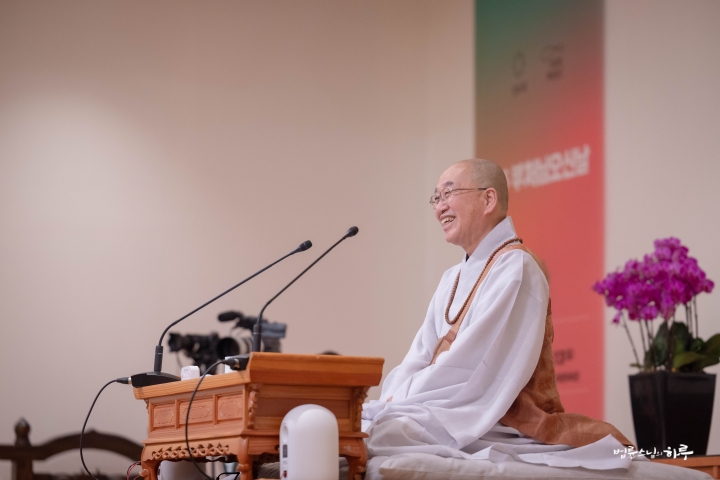
If your Jungto Society activities are making your husband feel lonely, it might help to reduce those activities and spend more time with him. You could also invite him to attend the Jungto Dharma School with you or participate in volunteer activities together. Keeping busy with daily life can help one forget past pain. If your husband stops everything and only thinks about his son, he’ll become trapped in those thoughts. These thoughts will intensify and become more painful over time. While your husband may occasionally cry when thinking about your son, it’s important to help him focus his attention on other activities during those times.”
“Yes, I understand.”
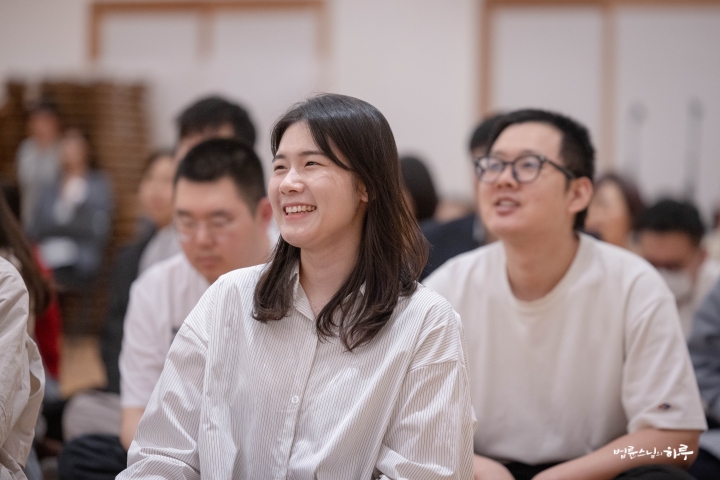
The questions continued to come.
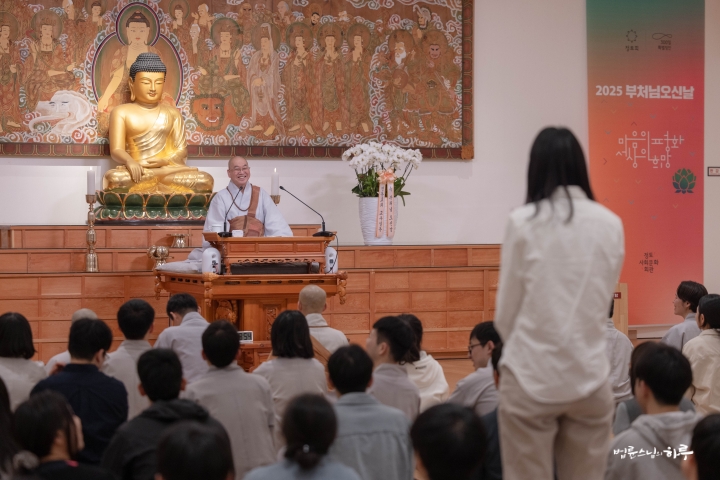
• I found 108 bows very helpful, but I don’t understand why we need to do 1,080 bows.
• I lived in tension during my childhood due to my father’s violence, and this still affects my relationships with others. How can I get along better with teenagers going through puberty?
• I often say things I don’t really mean, and when my boss gives me instructions, I say I can do them even though I think I can’t. Does this also count as lying?
After speaking with four people, it was time to end the Weekly Dharma Assembly. The participants shared their thoughts in groups and concluded the assembly just before 10 PM.
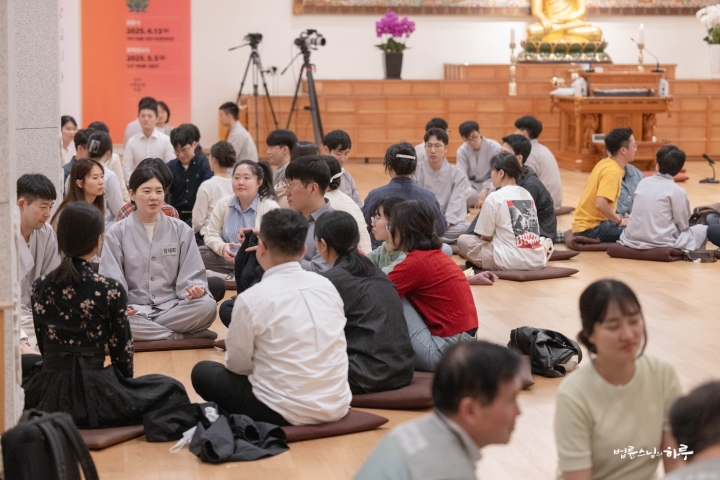
Tomorrow will be the 74th day of the 100-Day Dharma Talk. In the morning, Sunim will give the second lecture on the Heart Sutra at the Dharma Hall on the third floor of the Jungto Social and Cultural Center. In the afternoon, he will visit the Jogye Order Headquarters to present a donation for forest fire disaster relief and cultural heritage restoration. In the evening, he will deliver the 16th lecture of the Buddhist Social Studies Course in the basement auditorium.




